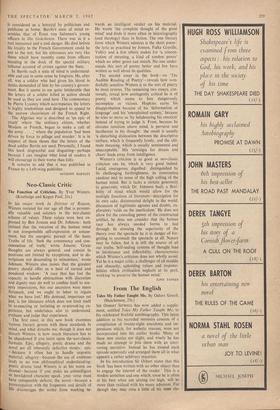Neo—Classic Critic
IN his major work In Defense of Reason, Winters restated for our age all that is perenni- ally valuable and salutary in the neo-classic scheme of values. These values were best ex- pressed by Ben Jonson and Dr. Johnson: both insisted that the vocation of the human mind is not irresponsible self-expression or amuse- ment, but the energetic pursuit of the basic Truths of life. 'Seek the consonancy and con- catenation of truth,' wrote Jonson; 'Great thoughts are always general, and consist in positions not limited by exceptions, and in de- scriptions not descending to minuteness,' wrote Johnson. Winters also insists that the greatest poetry should offer us a haul of earned and pondered wisdom : 'A race that has lost the capacity to handle abstractions with discretion and dignity may do well to confine itself to sen- sory impreisions, but our ancestors were more fortunate, and we ought to labor to regain What we have lost.' His demand, imperious yet Just, is for literature which does not limit itself to re-enacting or imitating or re-provoking ex- perience, but undertakes also to understand, evaluate and judge that experience.
The first essay in this new book examines various literary genres with these standards in mind, and what disturbs me, though it does not disturb Winters, is how much literature has to be abandoned if you insist upon the'neo-classic formulae. Epic, allegory, poetic drama and the novel are all inherently defective modes: epic —because it often has to handle unpoetic material; allegory—because the use of emblems leads to no true philosophical understanding; poetic drama (and Winters is at his worst on drama)--because if you make an unintelligent or bewildered character speak, your verse must
have comparable defects; the novel—because a preoccupation with the fragments and details of life discourages the writer from working to-
wards an intelligent verdict on his material. He wants 'the complete thought of the great mind' and finds it more often in historiography (and theology) than in fiction. The one literary form which Winters admires is the short poem : the lyric as practised by Jonson, Fulke Greville, Valery and a few others makes for 'a concen- tration of meaning, a kind of sombre power' which no other genre can match. No one under- stands this sort of poetry better and few have written as well about its qualities.
The second essay in the book—on 'The Audible Reading of Poetry'—reveals how won- derfully sensitive Winters is to the sort of poetry he most reveres. The remaining two essays, con- versely, reveal how astringently critical he is of poetry which seems to him dangerously incomplete or vicious. Hopkins earns his disapprobation because of his 'deformation of language' and his 'unexplained ecstasy,' because he tries to move us `by belabouring his emotion' instead of trying to judge it. Frost, because he elevates intuition above mind, is perverse and incoherent in his thought: the result is usually `a disturbing dislocation between the descriptive surface, which is frequently lovely, and the ulti- mate meaning, which is usually sentimental and unacceptable.' His 'nostalgia for dream and chaos' leads away from intelligence.
Winters's criticism is as good as neo-classic criticism can be, which is very good indeed. Lucid, courageous, dignified: distinguished by its challenging forthrightness, its remorseless candour and its sense of the high calling of the human mind. But it lacks a certain generosity (a generosity which Dr. Johnson had), a flexi- bility of mind which would allow for the multiple functions of literature—description for its own sake, disinterested delight in the world, discussion of legitimate agonies and doubts, ex- ploratory 'raids on the inarticulate.' He does not allow for the consoling power of the constructed artifact, he does not consider that the human race has always needed forms to feel through. In stressing the superiority of the theory over the spectacle he is in danger of for- getting to reconsult the spectacle at all. Nature may be fallen, but it is still the source of all our truths. Self-sealing systems of thought lead to intolerance and inflexibility, characteristics which Winters's criticism does not wholly avoid. Yet he is a major critic, a challenger of all muddle and obscurity, upholding values and responsi- bilities which civilisation neglects at its peril, working `to preserve the human mind.'
TONY TANNER


































 Previous page
Previous page